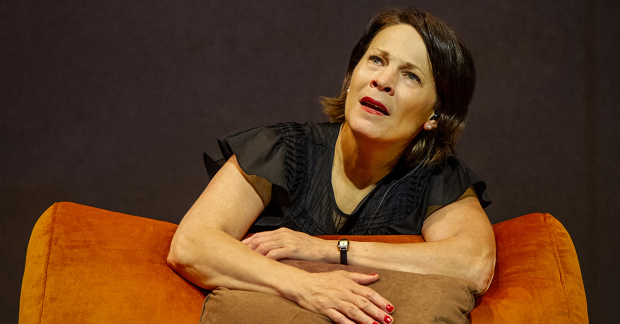Review: Wallace Shawn's The Fever, Starring Lili Taylor, Fails to Give Any Chills

(© Daniel Rader)
The Fever begins with Lili Taylor entering from an aisle, wearing a Covid face mask, carrying a large purse and an iced coffee. She walks onto the stage and begins to create the set herself, telling us that the chair, end table, and lamp are there just to vaguely suggest a room because it is helpful for telling her story. She informs the audience that this play will be about an hour and a half and that there are no other characters. Though unexpected and untraditional, I appreciate this frame for its transparency; it was a sort of living program note. It was also clear and succinct — two qualities that this play by Wallace Shawn completely lack.
The Fever is a story of traveler in a war-torn foreign country who comes down with — you guessed it — a fever. Burning up in bed and later lying on the cold bathroom floor and vomiting, her symptoms operate on a literal and a symbolic level, foreshadowing what's to come. The Fever might aptly be described as a fever dream of a play, made up of one very long, stream-of-consciousness, word-vomit monologue.
This traveler is a financially comfortable white woman who reads Marx and gradually becomes disenchanted about capitalism. She rethinks the values she grew up with, the things her friends say about political economics, and the ways she has been complicit in the violence of global capitalism. However, her views bounce back and forth like a tennis ball as she trips over her own hypocrisies. Though it is hard to find a coherent stance here, or totally figure out how self-aware she is about her own privilege, there is something terrifyingly prescient about her faux-wokeness.
Originally performed in New York City apartments in the 1990s by Shawn himself, this New Group and Audible Theatre production at the Minetta Lane is directed by Scott Elliott, who also staged the piece in 2008, during the financial crisis. In 2021, the play has newfound relevance, working in conversation with recent labor strikes, a supposed workforce labor crisis (which is actually a crisis about wages and fair treatment), and ongoing inequity about vaccine-related resources across the globe.
While there is much talk of "performative wokeness" online, the term is used incorrectly: for something to be "performative" there must be action. Something must be achieved. Much like the political pandering celebrities get called out for online, the character here seems to be all talk — the only thing she does is visit a foreign country in the midst of a political revolution. She is not a comrade, but a tourist, and one who repeatedly admits that she doesn't even speak the native language.
This fits so well within our current moment, where over the past year and a half many people have undergone a reconsideration of their central values but may not have actually changed much. This can be easily witnessed right within the theater community: talk about meaningful change about labor concerns, unions, and work hours as well as diversity and inclusion certainly led to lots of public statements and "conversations" and panels, but how much really changed? Did the industry change, or like The Fever, was it all just talk for the sake of talk? Is all this awakening too little too late?
One-person shows, a particularly popular type this season, certainly make sense right now — they are cheaper to produce and safer to run in a pandemic. That said, they can often feel like a slog, and they require a very strong performer to hold them up. Sadly, an otherwise-talented Taylor is not up to the job. She fails to take us on a journey and things feel frustratingly static. Her cadence and speech pattern, which is nearly identical for almost every sentence, creates a soporific effect that makes it difficult to pay attention to an already difficult, only loosely structured piece that is equal parts reverie and lecture. What's more, Taylor seemed to struggle with the amount of text, frequently tripping over her words.
Though The Fever might have something to offer us in our current political moment, its critique of capitalism feels rather basic and lacks nuance. Maybe this felt like radical chic in the '90s, but it now comes across as obvious and dated. Even more disappointing, any power behind its message is muddled by this lackluster production. Much like a fever itself, we can only be happy when it finally breaks.











